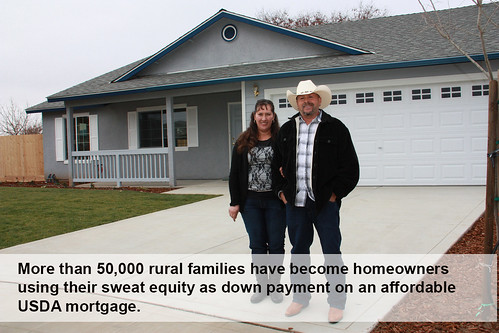
More than 50,000 rural families have become homeowners using their “sweat equity” as their down payment on an affordable USDA mortgage.
What is “sweat equity?” These families have helped build their own homes and provided most of the construction labor with guidance from a qualified construction supervisor through USDA’s Mutual Self-Help Housing Loan Program. The “sweat equity” — the savings in labor costs — reduced the amount of the home loan and made the monthly payments affordable.
June is National Homeownership Month. USDA is celebrating the self-help program and the 50,000+ rural families who have invested in a home of their own through self-help housing.
The self-help program provides affordable home loans to low-income individuals and families for homes in rural areas and towns. It has helped families like Maria and Ignacio Gordillo, of Reedley, Calif. Along with 10 other families, the Gordillos helped build their house last year in partnership with Self-Help Enterprises. Self-Help Enterprises is a “sweat equity” pioneer with almost 50 years of experience helping low-income residents of California’s San Joaquin Valley, such as farm laborers and their families, achieve homeownership.
In Lafayette, Ore., Debbie Mayo helped construct her home and those of 12 other families. In what the local partner Community Home Builders calls “neighbors building neighborhoods,” the participants worked at least 30 hours each week on each others' homes during the nine-month construction period. Since 1996, Community Home Builders and USDA have helped more than 160 rural Oregon families get homes of their own and have built eight communities.
USDA’s Self-Help Housing Program also provides payment assistance that can reduce the interest rate on the loans to as low as 1 percent.
To learn more about self-help housing and whether you qualify, contact the USDA Rural Development local representative who serves your area. Local self-help organizations also offer assistance and training. Housing specialists in USDA Rural Development local offices can tell you if there is a self-help supervisor or project underway near you.

